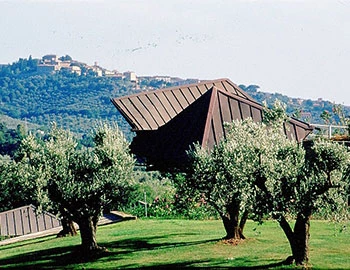Barbera d'Alba superiore Rocche delle Rocche 2019
DOC, Rocche Costamagna, 750 ml

| Grape variety: | Barbera |
| Producer: | Rocche Costamagna / Alessandro Locatelli |
| Origin: | Italy / Piemont / Barbera d'Alba |
Description
Full-bodied Barbera Superiore and an excellent food companion! This Piedmontese wine exudes a generous aroma of hyacinths, dark sweet cherries and nutty-sweet marron glacé. On the palate powerful, with a variety of dark fruity flavours, flavours that combine with fine spices and a pleasant freshness. An exciting wine with an aromatic finish. Goes perfectly with Italian cuisine! (SiKl)
Attributes
| Origin: | Italy / Piemont / Barbera d'Alba |
| Grape variety: | Barbera |
| Label: | Vegan |
| Ripening potential: | 5 to 8 years |
| Drinking temperature: | 16 to 18 °C |
| Food Pairing: | Brasato di manzo al Barolo, Moroccan specialities, Meat salad, Italian antipasti, Vegetable flan, quiche, Succulent chicken breast with cream sauc |
| Vinification: | fermentation in steel tank, Punching down, soft pressing |
| Harvest: | hand-picking |
| Maturation: | in new barriques, some months bottle storage before sale |
| Volume: | 14.5 % |
| Note: | Contains sulphites |
Rocche Costamagna / Alessandro Locatelli
The wines of Rocche-Costamagna are a result of the perfect interplay of geographical location, meticulous care both in the vineyard and in the cellar, and decades of experience.
The term "Rocche" usually refers to a natural hilly landscape. In this case, it refers to a privileged wine-growing area, the family's historic cru, called "Rocche dell'Annunziata" (covering 6 of the 14 hectares of the family estate).
"Costamagna" is the family name of the winery owners in La Morra, where high quality wines have been produced and distributed for over 160 years. The evidence for this centuries-old tradition is a document dating back to 1841: a retail licence for the wines from the estate's own vineyards. Since the late 1960s, the business has been run by Claudia Ferraresi, the granddaughter of the widow Costamagna, accompanied by her husband Giorgio. Today, their son Alessandro Locatelli is in charge, assisted by agronomist Gian Piero Romana and oenologist Giuseppe Caviola.

Italy
Italy – Where wine is a way of life
The Italian wine regions are extremely diverse, and this is made clear in their wines. Established varieties such as Merlot, Syrah, and Sauvignon can be found on just 15 percent of the total vine growing area. The remaining 85 percent is reserved for autochthonous, indigenous varieties. More than 2,000 different grape varieties are grown under diverse conditions and pressed with various techniques into wines that reach the top tier of the international wine market.



